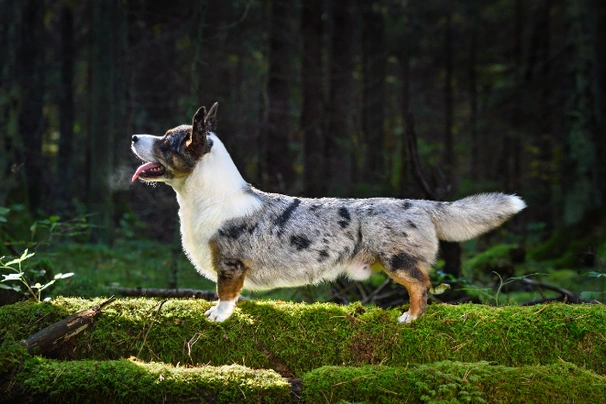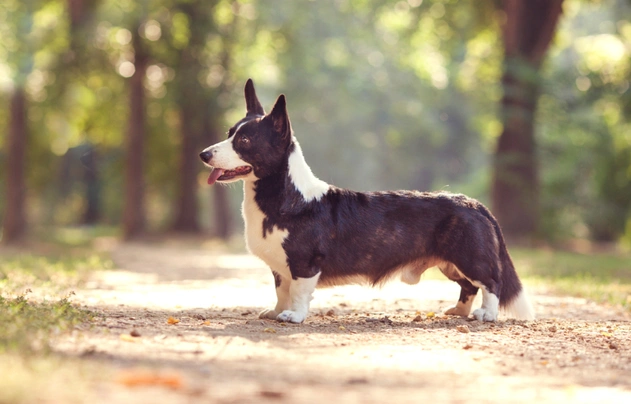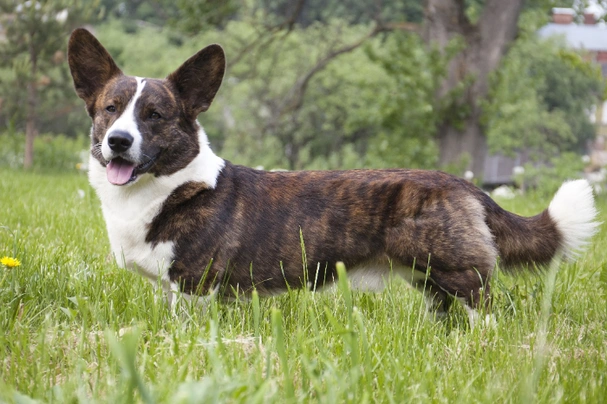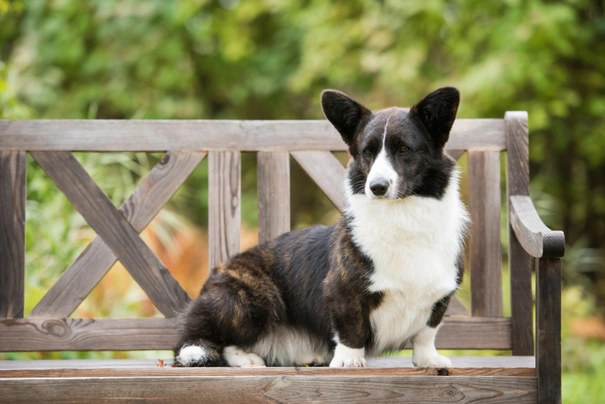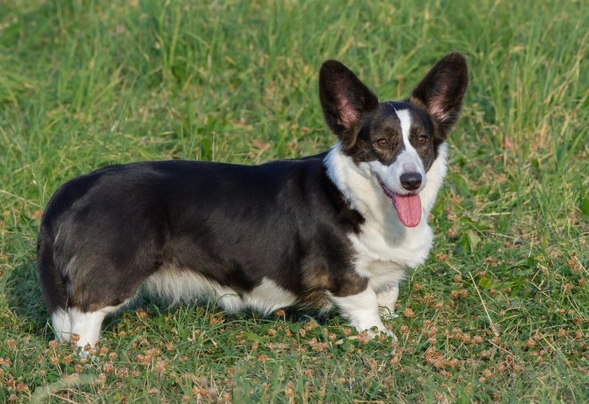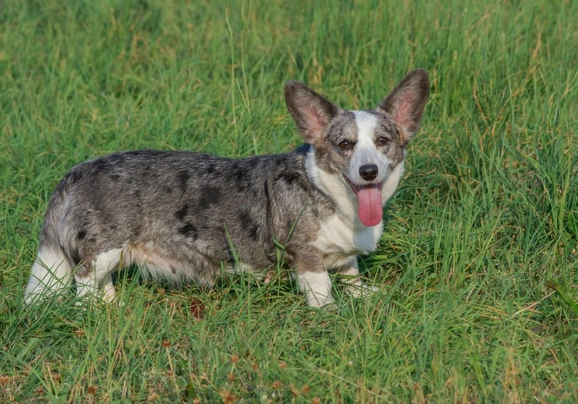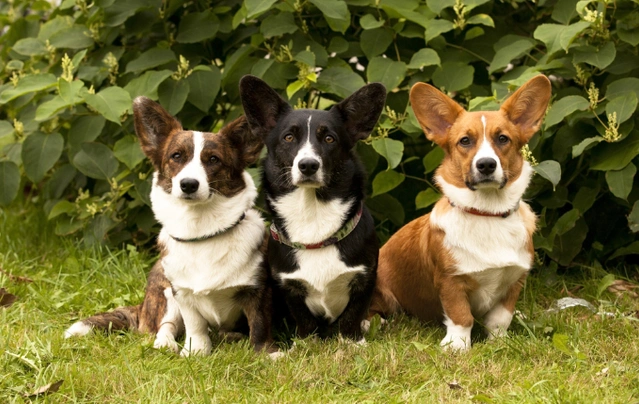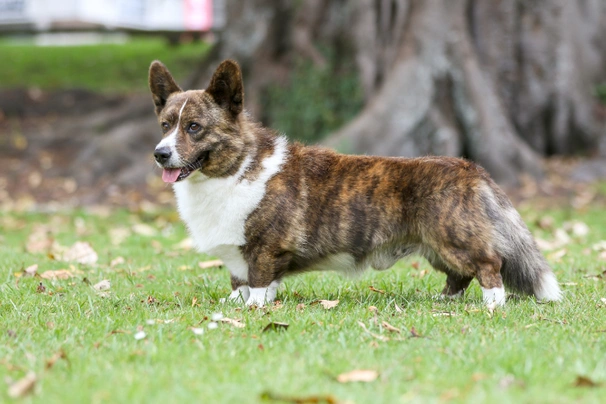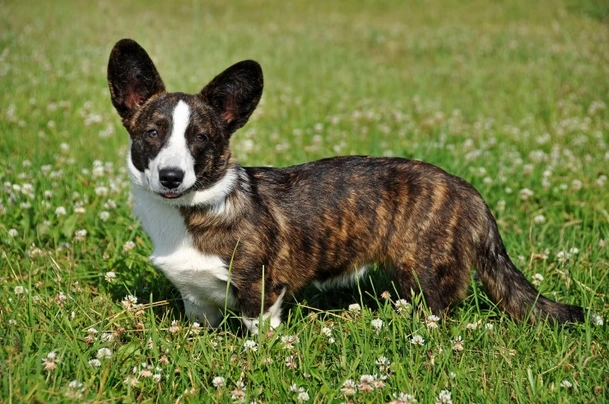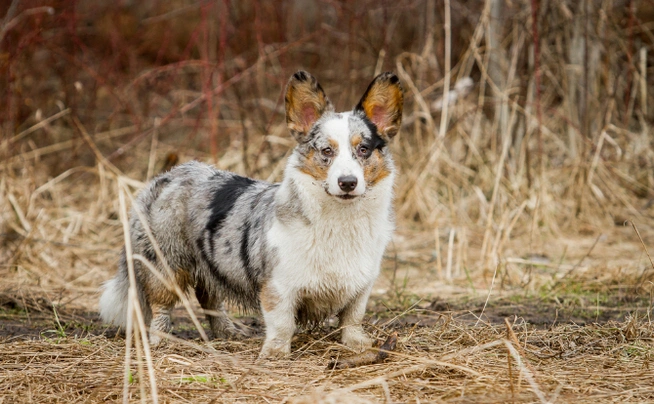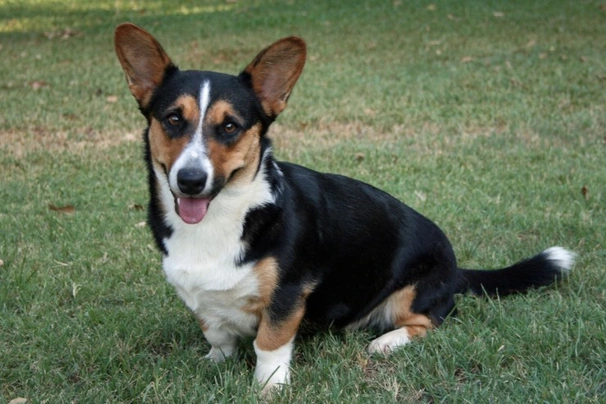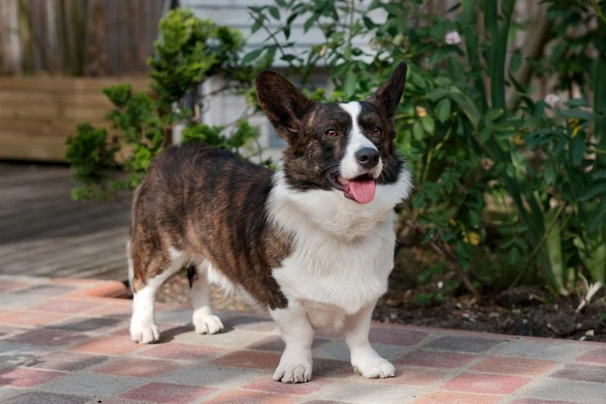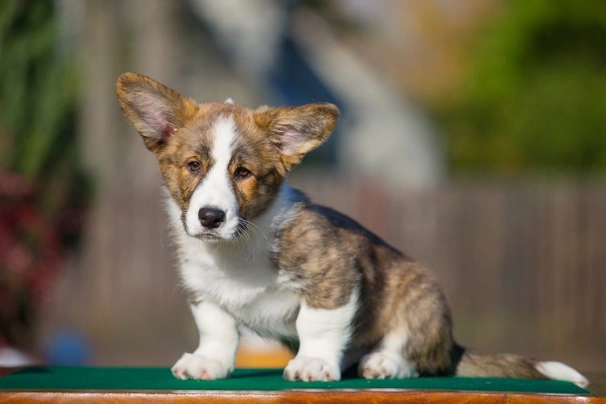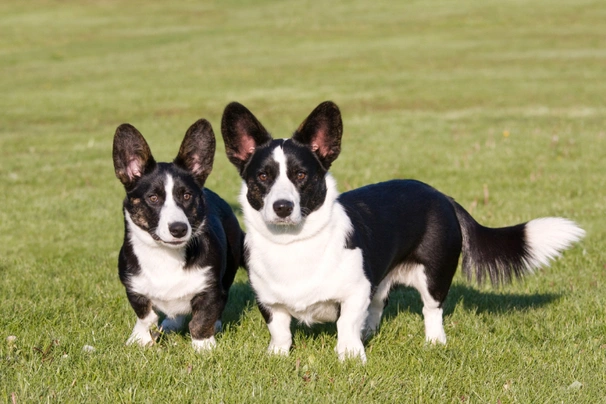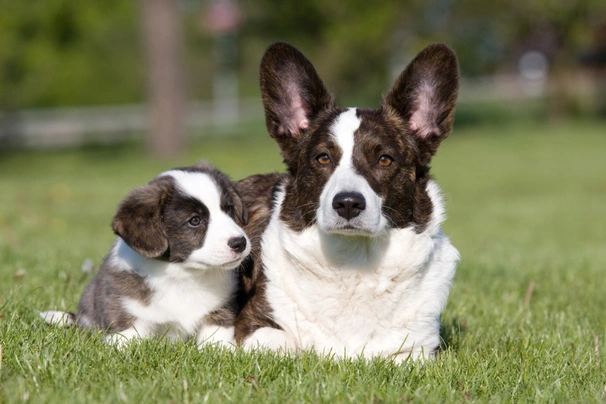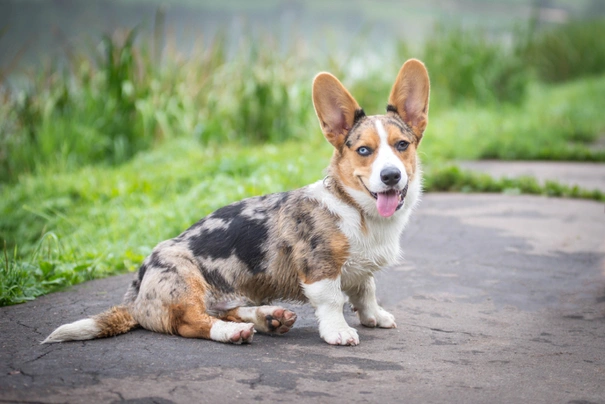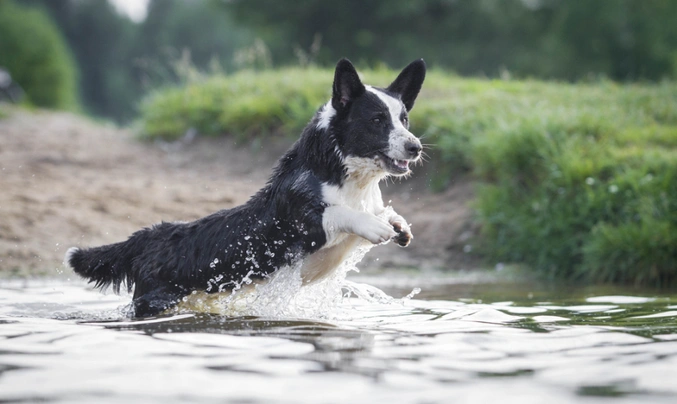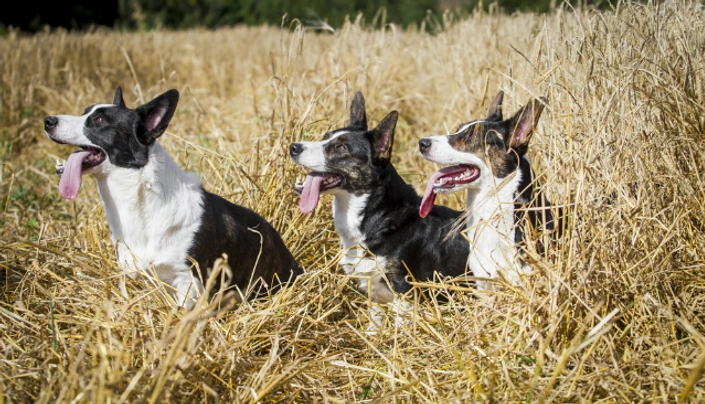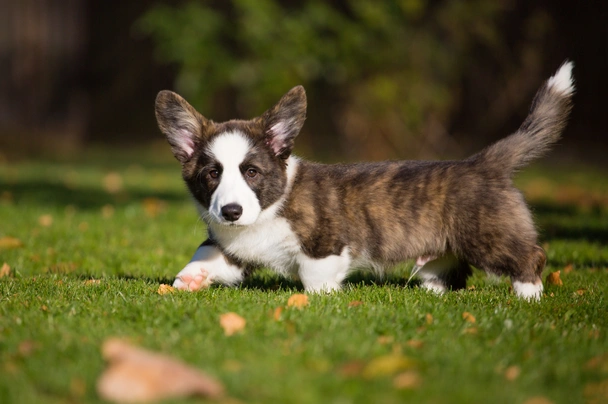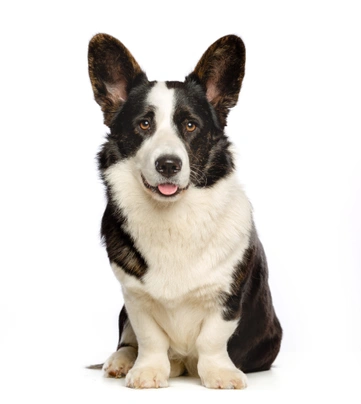Welsh Corgi Cardigan
Pros
Cons
Introduction of the Welsh Corgi Cardigan
The Cardigan Welsh Corgi is one of the UK’s vulnerable native breeds with few well-bred pedigree puppies being registered with The Kennel Club every year. They are charming little dogs that at one time were recognised as being the same as the Pembroke Welsh Corgi but in the thirties the KC recognised them as separate breeds.
Although not as popular as the Pembroke the Cardigan Corgi boasts not only being a charming looking little dog but they are also extremely loyal and affectionate characters by nature which means they are a pleasure to be around. They love to please and being so intelligent Cardies learn new things very quickly and are known to do well in obedience.
History of the Welsh Corgi Cardigan
Studies have established that Cardigan Welsh Corgis were bred by the Teckel family who introduced them to the country. The small village of Bronant it seems was where Corgis were the only dogs being bred. Back in the day the breed was referred to as Bronant type Corgis because the last of the pure-blood Corgi was found in the village.
There are records of working cattle dogs that date back to Ancient Welsh Laws which refers to various dog types some of which were called “watch curs” “shepherd curs” and “house curs”. With this said there are other references of “herdsman’s cur” that date back 1000 years or so. These dogs were used to guard and herd flocks of sheep and cattle being highly prized for their skills and therefore considered as being “valuable and necessary assets” for Welsh Shepherds and farmers. Good working dogs of a certain age were valued as being worth the price of an ox.
All Corgis are “heelers” which means they work by nipping at the heels of animals they want to move on. As such when the first dogs were exhibited at agricultural shows in Wales they were classed as being “Heelers” and the original dogs looked very much like “bull-chested” dachshunds that were around at the time. To begin with there were just three breed colours namely a golden yellow/red gold merles both blue and blue grey with the third colour being a golden/brown merle. All Corgis had some white in their coats. However although attractive these dogs were prized for their intelligence their courage their reliability and their obedience.
Corgis were considered as family “treasures” because they were such a necessary possession to shepherds and farmers who owned large flocks of livestock. As such even back in olden times they were carefully and selectively bred to ensure that only the best Corgis were used for breeding purposes. They were also valued watch dogs and although small in stature they would stay close to any strangers and/or trespassers until an owner appeared.
However Corgis were never a “herding” dog as such their strength lay in rounding up a herd or a flock which ultimately was the breed’s undoing. The reason being that often a dog would startle the animals which would send them running or stampeding in the wrong direction instead of towards the shepherd. As such Corgis were known as “Brindle Herders” acted more like a fence or a barrier. This meant that when wire fences were introduced to Welsh regions in around 1875 it had a serious impact on the breed and their numbers.
Fortunately not all farmers and crofters kept their stock on fenced land preferring to use “common land” and therefore they still needed Corgis and Corgi crosses at their side. The two main dogs were known as a small “Red Cattle Herder” or Red Heeler and the other one was the Brindle Herder. Red Herders were very good working dogs but not as social by nature as their Brindle counterparts dogs which were charming devoted and honest by nature.
Over time the breed evolved to be finer in appearance but farmers were not impressed with the changes at the time. With this said farmers with lands on higher grounds kept their original working dogs retaining the breed’s purer lines whereas those in the lowlands did so in lesser numbers. With this said pure Corgis were often crossed with Scottish Collies. As such the Corgis seen in the more remote areas of Wales that boasted purer lines are the ancestors of the Cardigan Corgis we see today.
As previously mentioned for a long time both the Pembroke and the Cardigan were considered the same breed by The Kennel Club but in 1934 the two were finally recognised as separate breeds and subsequently two standards were established for both. Today Cardigan Welsh Corgis are not as popular as they once were even though they boast charming natures and are known to form very strong bonds with their families and owners. This in short means they make wonderful companions and family pets. However anyone wanting to share a home with a Cardie would need to register their interest with breeders and agree to go on a waiting list for the pleasure of doing so.
Interesting facts about the breed
- Is the Welsh Corgi Cardigan a vulnerable breed? Yes they are on the Kennel Clubs vulnerable native breed list and very few well-bred puppies are registered with the Kennel Club every year
- The breed was once known as Brindle Heelers because of the way they nipped at the heels of livestock they wanted to move on
- The breed is an ancient one and it is thought that Corgis were only bred in the Welsh village of Bronant during the 1800’s
- Some Corgis have naturally “bobbed” tails
- Traditionally a Cardie’s tail was always docked but since the law banning the procedure came into effect in 2007 tail docking is now illegal with the exception being for some working breeds and if a dog suffers from some sort of health issue that requires their tails to be docked. The procedure must be agreed and authorised before being performed by a qualified vet
Appearance of the Welsh Corgi Cardigan
Height at the withers: Males 27 - 33 cm Females 27 - 33 cm
Average weight: Males 14 - 17 kg Females 11 - 15 kg
The Cardigan Corgi is very similar looking to a Pembroke Corgi only their coats can be many different colours with the one proviso being that no dog should have white as the predominant colour. They are sturdy looking little dogs that boast a tremendous amount of stamina and endurance which is clearly visible in the way they are put together. They are longer in the body than they are tall. They boast having very fox-like heads with nice wide skulls that are flat between a dog's ears before it tapers at their eyes giving their heads a slightly domed appearance. They have moderate stops nice clean-cut jaws and black noses.
Their eyes are medium in size dark in colour and set obliquely with the corners being very well defined. Cardigans always having a kind keen and interested expression in their eyes which adds to their endearing looks. Dogs with blue merle coats can have blue or blue flecked eyes whether it's one or both eyes. Their ears are quite large in proportion to their body which dogs hold erect. The tips are slightly rounded and wider at the base being set well back. The Cardigan has a strong jaw with a perfect scissor bite where their upper teeth neatly overlap their lower ones.
Their necks are well developed and muscular being nicely proportioned and sloping well back into a dog's muscular and well laid-back shoulders. Front legs are short but powerful and muscular with a good amount of bone right down to a dog's feet which turn slightly outwards. Their bodies are compact with dogs having quite broad chests and prominent breast bones. They have deep briskets with well sprung ribs a nicely defined waist and level topline.
Their hindquarters are strong with dogs having short but extremely powerful back legs with muscular first and second thighs. Back feet are round and tight being quite large and nicely padded. Their tails are very fox-like being bushy being set in line with a dog's body and quite long which dogs carry low when at rest but higher when they are alert or working.
When it comes to their coat the Cardigan Welsh Corgi boasts having a short or medium length extremely weather-proof coat that's hard to the touch. Their undercoat is much softer and denser. The accepted breed colours for Kennel Club registration are as follows:
- Black Brindle & White
- Blue Merle
- Brindle
- Brindle & White
- Brindle Point Tricolour
- Red & White
- Red Brindle
- Red Brindle & White
- Red Point Tricolour
- Sable
- Sable & White
- Tricolour
It is worth noting that the accepted breed colours for Kennel Club registration can differ from those set out in the breed standard.
Gait/movement
When a Cardie moves they do wo with an active free motion keeping their elbows close to their sides. They have a good reach with their front legs which they never lift too high and they have a thrusting action from their back legs.
Faults
The Kennel Club frowns on any exaggerations or departures from the breed standard and would judge the faults on how much they affect a dog's overall health and wellbeing as well as their ability to perform.
Males should have both testicles fully descended into their scrotums and it is worth noting that a dog can be a little lighter or heavier as well as slightly taller or shorter than set out in the Kennel Club breed standard which is only given as a guideline.
Temperament of the Welsh Corgi Cardigan
The Cardigan is a more laid-back character as compared to their Pembroke cousins although when the need arises they can be extremely quick off the mark. They form strong bonds with their owners and are always willing to work when asked. With this said they are highly adaptable characters that fit well into most lifestyles with the greatest of ease.
They are intelligent little dogs that like to be kept busy which means they are best suited to people who live in more rural areas of the country and who lead active outdoor lives. Cardigans have a deeply embedded instinct to herd everything they come across which is a trait that needs to be gently curbed before it turns into a real problem especially as their technique is to nip at the heels of anything they want to move along.
Cardigans need to be socialised from a young age and this must include introducing them to lots of new situations noises people other animals and dogs once they have been fully vaccinated. This helps them mature into more outgoing confident yet relaxed adult dogs no matter where they find themselves. Their training also must start early with puppies being taught the "ground rules" from the word go so that boundaries are established. Their training can begin in earnest once they have been fully vaccinated.
Being so intelligent and eager to please in the right hands and environment a Welsh Cardigan Corgi is easy to train and will quickly pick things up. The downside being they are just as quick to pick up any bad habits and behaviours too. As such dogs need to be handled and trained with a firm yet fair and gentle hand so they understand what is expected of them. Cardigans need to be taught their place in the pack and who is the alpha dog in a household for them to be truly happy well rounded and obedient dogs.
They can be a little aloof and wary around people they don't know but rarely would a Cardigan show any sort of aggression towards a stranger preferring to keep their distance until they get to know someone.
Are they a good choice for first time owners?
Cardies are the perfect choice for first time dog owners because they are so amenable and people-oriented loving nothing more than to please and to entertain their families. They are particularly good with children and older people too. With this said they are better suited to people who like to take long walks because Cardies thrive on being in the great outdoors and would happily walk for hours.
What about prey drive?
Although Cardies are very social by nature they have high prey drive and would happily chase anything that tries to run away from them or which they spot in the distance. As such care should always be taken as to where and when a dog can run off the lead more especially if there is livestock or wildlife close by.
What about playfulness?
Cardies are known to have a very playful side to their natures and love to entertain and be entertained. They are known to be a little mischievous when the mood takes them and being so clever they quickly learn what pleases an owner and how to get their own way.
What about adaptability?
Cardies are highly adaptable dogs and providing they are given enough daily physical exercise combined with as much mental stimulation to prevent boredom from setting in they are just as happy living in an apartment in town as they would be living in a house in the country.
What about separation anxiety?
Although Cardigan Welsh Corgis form strong ties with their families and are incredibly devoted and loyal they don’t generally suffer from separation anxiety when they are left on their own providing it is never for too long that is. No dog likes to be left to their own devices for long periods of time and it could result in them developing some unwanted and destructive behaviours around the home.
What about excessive barking?
Some Cardies like the sound of their own voices a little too much which is something that needs to be gently nipped in the bud when a dog is still young being careful not to frighten them which could end up making them withdrawn and timid. Others will only bark when there are strangers about or when something they don't like is going on in their surroundings and as a way of alerting an owner.
Do Welsh Cardigan Corgis like water?
Most Cardies like swimming and will take to the water whenever they can more especially when the weather is hot. However if anyone who owns a dog that does not like water should never force them to go in because it would just end up scaring them. With this said care should always be taken when walking a Cardie off the lead anywhere near more dangerous watercourses just in case a dog decides to leap in or falls in and then needs rescuing because they cannot get out of the water on their own.
Are Welsh Cardigan Corgis good watchdogs?
Cardies are natural watchdogs which is something that is deeply embedded in their psyche and as such they are always quick off the mark when it comes to protecting their owners and their property. They tend to stick close to strangers until their owners come to check out what is going on.
Intelligence / Trainability of the Welsh Corgi Cardigan
Cardigans are very intelligent and there is nothing they enjoy more than a challenge which when paired to the fact they love to please makes them highly trainable. However they are smart enough to take control of a training session if allowed which is why they need to be handled with a firm yet gentle hand. These dogs like to know who they can look to for direction and guidance because if they do not they would quickly show a more dominant side to their nature which can make dogs unruly and harder to live with.
It’s best to keep training sessions short and very interesting so that dogs stay more focussed on what they are being asked to do. Longer more repetitive training sessions do not bring the best out of these clever little dogs. They respond well to positive reinforcement but do not answer well to any sort of harsh correction or heavier handed training methods because they are quite sensitive dogs by nature and it could result in a dog becoming shy withdrawn and timid.
Cardie puppies like all puppies are incredibly cute but they are also extremely intelligent and pick up new things very quickly which includes the good and the bad. As such owners must start out as they mean to go on which means that as soon as a puppy is nicely settled into a new home they are taught the rules and boundaries which helps them understand what is expected of them. It also helps establish a “pecking order” and who is the alpha dog in a household. As such the first commands a puppy should be taught are as follows:
- Come
- Sit
- Stay
- Heel
- Quiet
- Leave it
- Down
- Bed
Children and other
In general and providing a Cardigan has been well socialised from a young age they are easy going little dogs that boast having playful yet laid back natures. As such they get on well with children providing the kids know how to behave around dogs. With this said they are not the best choice for families where the children are still very young but a great choice in households where the kids are that much older.
They usually get on with other dogs more especially if well socialised from a young enough age. If they have grown up with a family cat in the home they usually get on well together. However a Cardigan would think nothing of chasing off any other cats they come across. Because of their strong instinct to round up and herd care must be taken when they are around any smaller animals and pets.
Health of the Welsh Corgi Cardigan
The average life expectancy of a Cardigan Welsh Corgi is between 12 and 15 years when properly cared for and fed an appropriate good quality diet to suit their ages.
The Cardigan is known to suffer from a few hereditary health issues which are worth knowing about if you are planning share your home with one of these active and good-looking dogs. The conditions that seem to affect the breed the most include the following:
- Progressive retinal atrophy (PRA) - Breeders should have stud dogs eye tested through the BVA/KC eye scheme
- Hip dysplasia - Breeders should have stud dogs hip scored by a BVA vet
- Congenital deafness – dogs should be BAER tested through the Animal Health Trust (AHT)
- Degenerative myelopathy (DM)
- Glaucoma
- Urogenital
- Urolithiasis
- Back Problems
- Obesity
What about vaccinations?
Cardie puppies would have been given their initial vaccinations before being sold but it is up to their new owners to make sure they have their follow-up shots in a timely manner with the vaccination schedule for puppies being as follows:
- 10 -12 weeks old bearing in mind that a puppy would not have full protection straight away but would be fully protected 2 weeks after they have had their second vaccination
There has been a lot of discussion about the need for dogs to have boosters. As such it's best to talk to a vet before making a final decision on whether a dog should continue to have annual vaccinations which are known as boosters.
What about spaying and neutering?
A lot of vets these days recommend waiting until dogs are slightly older before spaying and neutering them which means they are more mature before undergoing the procedures. As such they advise neutering males and spaying females when they are between the ages of 6 to 9 months old and sometimes even when a dog is 12 months old.
Other vets recommend spaying and neutering dogs when they are 6 months old but never any earlier unless for medical reasons. With this said many breeds are different and it is always advisable to discuss things with a vet and then follow their advice on when a dog should be spayed or neutered.
What about obesity problems?
Cardies like their food and therefore are prone to plough on the pounds if not given enough daily exercise. With this said like other breeds they can gain weight after they have been spayed or neutered and it's important to keep an eye on a dog's waistline just in case they do. If a dog starts to put on weight it's important to adjust their daily calorie intake and to up the amount of exercise they are given. Older dogs too are more prone to gaining weight and again it's essential they be fed and exercised accordingly because obesity can shorten a dog's life by several years. The reason being that it puts a lot of extra strain on a dog's internal organs including the heart which could prove fatal.
What about allergies?
Some Cardies are prone to suffering from allergies and it's important for a dog to see a vet sooner rather than later if one flares up. Allergies can be notoriously hard to clear up and finding the triggers can be challenging. With this said a vet would be able to make a dog with an allergy more comfortable while they try to find out the triggers which could include the following:
- Certain dog foods that contain high levels of grains and other cereal-type fillers
- Airborne pollens
- Dust mites
- Environment
- Flea and tick bites
- Chemicals found in everyday household cleaning products
Participating in health schemes
All responsible Welsh Cardigan Corgi breeders would ensure that their stud dogs are tested for known hereditary and congenital health issues known to affect the breed by using the following schemes:
- DNA test - PRA (rcd3)
- BVA/KC/ISDS Eye Scheme
- BAER test through the Animal Health Trust (AHT) for congenital deafness
What about breed specific breeding restrictions?
As of January 2013 puppies whelped from merle to merle matings can no longer be registered with the Kennel Club because of the health issues associated with the merle gene which can negatively impact a dog’s vision and hearing.
As of January 2015 Welsh Cardigan Corgis that have tested clear or hereditary clear for PRA-red3 can be registered with the Kennel Club and both parents must have been tested clear too.
No puppies that have tested to be “carriers” can be registered after January 2014.
What about Assured Breeder Requirements?
It is mandatory for all Assured Kennel Club breeders to use the following test on their dogs and all other breeders are strongly advised to follow suit:
The Kennel Club also strongly recommends that all breeders use the following test on their dogs:
Caring for the Welsh Corgi Cardigan
As with any other breed Cardigans need to be groomed on a regular basis to make sure their coats and skin are kept in top condition. They also need to be given regular daily exercise to ensure they remain fit and healthy. On top of this dogs need to be fed good quality food that meets all their nutritional needs throughout their lives.
Caring for a Welsh Cardigan Corgi puppy
Cardie puppies are boisterous and full of life which means it's essential for homes and gardens to be puppy-proofed well in advance of their arrival. A responsible breeder would have well socialised their puppies which always leads to more outgoing confident and friendly dogs right from the word go. With this said any puppy is going to feel vulnerable when they leave their mother and littermates which must be taken into account. The longer a puppy can remain with their mother the better although it should never be for too long either.
It's best to pick a puppy up when people are going to be around for the first week or so which is the time needed for a puppy to settle in. Puppy-proofing the home and garden means putting away any tools and other implements that a boisterous puppy might injure themselves on. Electric wires and cables must be put out of their reach because puppies love chewing on things. Toxic plants should be removed from flowerbeds and the home too.
Puppies need to sleep a lot to grow and develop as they should which means setting up a quiet area that's not too out of the way means they can retreat to it when they want to nap and it's important not to disturb them when they are sleeping. It's also a good idea to keep "playtime" nice and calm inside the house and to have a more active "playtime" outside in the garden which means puppies quickly learn to be less boisterous when they are inside.
The documentation a breeder provides for a puppy must have all the details of their worming date and the product used as well as the information relating to their microchip. It is essential for puppies to be wormed again keeping to a schedule which is as follows:
- Puppies should be wormed at 6 months old
- They need to be wormed again when they are 8 months old
- Puppies should be wormed when they are 10 months old
- They need to be wormed when they are 12 months old
Things you'll need for your puppy
There are certain items that new owners need to already have in the home prior to bringing a new puppy home. It's often a good idea to restrict how much space a puppy plays in more especially when you can't keep an eye on what they get up to bearing in mind that puppies are often quite boisterous which means investing in puppy gates or a large enough playpen that allows a puppy the room to express themselves while keeping them safe too. The items needed are therefore as follows:
- Good quality puppy or baby gates to fit on doors
- A good well-made playpen that's large enough for a puppy to play in so they can really express themselves as puppies like to do
- Lots of well-made toys which must include good quality chews suitable for puppies to gnaw on bearing in mind that a puppy will start teething anything from when they are 3 to 8 months old
- Good quality feed and water bowls which ideally should be ceramic rather than plastic or metal
- A grooming glove
- A slicker brush or soft bristle brush
- Dog specific toothpaste and a toothbrush
- Scissors with rounded ends
- Nail clippers
- Puppy shampoo and conditioner which must be specifically formulated for use on dogs
- A well-made dog collar or harness
- A couple of strong dog leads
- A well-made dog bed that's not too small or too big
- A well-made dog crate for use in the car and in the home that's large enough for a puppy to move around in
- Baby blankets to put in your puppy's crate and in their beds for when they want to nap or go to sleep at night
Keeping the noise down
All puppies are sensitive to noise including Cardie puppies. It's important to keep the noise levels down when a new puppy arrives in the home. TVs and music should not be played too loud which could end up stressing a small puppy out making withdrawn timid and shy.
Keeping vet appointments
As previously mentioned Cardie puppies would have been given their first vaccinations by the breeders but they must have their follow up shots which is up to their new owners to organise. The vaccination schedule for puppies is as follows:
- 10 -12 weeks old bearing in mind that a puppy would not have full protection straight away but would only be fully protected 2 weeks after they have had their second vaccination
When it comes to boosters it's best to discuss these with a vet because there is a lot of debate about whether a dog really needs them after a certain time. However if a dog ever needed to go into kennels their vaccinations would need to be fully up to date.
What about older Welsh Cardigan Corgis when they reach their senior years?
Older Cardies need lots of special care because as they reach their golden years they are more at risk of developing certain health concerns. Physically a dog's muzzle may start to go grey but there will be other noticeable changes too which includes the following:
- Coats become coarser
- A loss of muscle tone
- Cardies can either become overweight or underweight
- They have reduced strength and stamina
- Older dogs have difficulty regulating their body temperature
- They often develop arthritis
- Immune systems do not work as efficiently as they once did which means dogs are more susceptible to infections
- Older dogs change mentally too which means their response time tends to be slower as such they develop the following:
- They respond less to external stimuli due to impaired vision or hearing
- They tend to be a little pickier about their food
- They have a lower pain threshold
- Become intolerant of any change
- Often an older dog can feel disorientated
Living with a Cardie in their golden years means taking on a few more responsibilities but these are easily managed and should include looking at their diet the amount of exercise they are given how often their dog beds need changing and keeping an eye on the condition of their teeth.
Older Cardies need to be fed a good quality diet that meets their needs at this stage of their lives all the while keeping a close eye on a dog's weight. A rough feeding guide for older dogs is as follows bearing in mind they should be fed highly digestible food that does not contain any additives:
- Protein content should be anything from 14 – 21%
- Fat content should be less than 10%
- Fibre content should be less than 4%
- Calcium content should be 0.5 – 0.8%
- Phosphorous content should be 0.4 – 0.7%
- Sodium content should be 0.2 – 0.4%
Older dogs don't need to be given the same amount of daily exercise as a younger dog but they still need the right amount of physical activity to maintain muscle tone and to prevent a dog from putting on too much weight. All dogs need access to fresh clean water and this is especially true of older dogs when they reach their golden years because they are more at risk of developing kidney disorders.
Grooming of the Welsh Corgi Cardigan
The Cardigan Corgi can either have a short or medium length extremely weatherproof coat thanks to a softer and much denser undercoat. They are low maintenance on the grooming front as it only takes a twice weekly brush to remove any dead and loose hair and a weekly wipe with a chamois leather to help keep a nice sheen on their coats.
It's also important to check a dog's ears on a regular basis and to clean them when necessary. If too much wax builds up in a dog's ears it can lead to a painful infection which can be hard to clear up. In short prevention is often easier than cure when it comes to ear infections.
Exercise of the Welsh Corgi Cardigan
The Cardigan Corgi is an energetic highly intelligent dog and they need to be given the right amount of daily exercise combined with a lot of mental stimulation for them to be truly happy well-rounded dogs. They need a minimum of 1 hour's exercise a day and more if possible with as much off the lead time as they can get so they get to really express themselves. If they are not given the right amount of mental stimulation and exercise every day a Cardigan would quickly get bored and could even begin to show some destructive behaviours around the home.
A shorter walk in the morning would be fine but a longer more interesting one in the afternoon is a must. These dogs also like to be able to roam around a back garden as often as possible so they can really let off steam. However the fencing must be extremely secure to keep these smart and energetic dogs in because if they find a weakness in the fence they will soon escape out and get into all sorts of trouble.
With this said Cardigan puppies should not be over exercised because their joints and bones are still growing. This includes not letting a dog jump up and down from furniture or going up or down the stairs. Too much pressure placed on their joints and spines at an early age could result in a dog developing serious problems later in their lives.
Feeding of the Welsh Corgi Cardigan
If you get a Cardigan puppy from a breeder they would give you a feeding schedule and it's important to stick to the same routine feeding the same puppy food to avoid any tummy upsets. A puppy's diet can be changed but this needs to be done very gradually always making sure they don't develop any digestive upsets and if they do it's best to put them back on their original diet and to discuss things with the vet before attempting to change it again.
Older dogs are not known to be fussy eaters but this does not mean they can be fed a lower quality diet. It's best to feed a mature dog twice a day once in the morning and then again in the evening making sure it's good quality food that meets all their nutritional requirements. It's also important that dogs be given the right amount of exercise so they burn off any excess calories or they might gain too much weight which can lead to all sorts of health issues. Obesity can shorten a dog's life by several years so it's important to keep an eye on their waistline from the word go.
Feeding guide for a Welsh Cardigan Corgi puppy
Puppies need to be fed a highly nutritious good quality diet for them to develop and grow as they should. As a rough guide a Cardie puppy can be fed the following amounts every day making sure their meals are evenly spread out throughout the day and it's best to feed them 3 or 4 times a day:
- 2 months old - 173g to 181g depending on puppy's build
- 3 months old - 199g to 213g depending on puppy's build
- 4 months old - 211g to 229g depending on puppy's build
- 5 months old - 214g to 233g depending on puppy's build
- 6 months old - 214g to 233g depending on puppy's build
- 8 months old - 177g to 211g depending on puppy's build
- 10 months old - 159g to 167g depending on puppy's build
Once a puppy is 12 months old they can be fed adult dog food.
Feeding guide for an adult Welsh Cardigan Corgi
Once fully mature an adult Cardie should be fed a good quality diet to ensure their continued good health. As a rough guide an adult Cardie can be fed the following amounts every day:
- Dogs weighing 11 kg can be fed 139g to 196g depending on activity
- Dogs weighing 14 kg can be fed 179g to 229g depending on activity
- Dogs weighing 15 kg can be fed 189g to 239g depending on activity
- Dogs weighing 17 kg can be fed 209g to 259g depending on activity
Welsh Corgi Cardigan price
If you are looking to buy a Cardigan Welsh Corgi you would need to register your interest with breeders and agree to being put on a waiting list because very few puppies are bred and registered with The Kennel Club every year. You would need to pay anything upwards of £700 for a well-bred pedigree puppy.
The cost of insuring a male 3-year-old Cardigan Welsh Corgi in northern England would be £22.37 a month for basic cover but for a lifetime policy this would set you back £44.21 a month (quote as of March 2018). When insurance companies calculate a pet's premium they factor in several things which includes where you live in the UK a dog's age and whether they have been neutered or spayed among other things.
When it comes to food costs you need to buy the best quality food whether wet or dry making sure it suits the different stages of a dog’s life. This would set you back between £20 - £30 a month. On top of this you need to factor in veterinary costs if you want to share your home with a Cardigan and this includes their initial vaccinations their annual boosters the cost of neutering or spaying a dog when the time is right and their yearly health checks all of which quickly adds up to over £900 a year.
As a rough guide the average cost to keep and care for a Cardigan Welsh Corgi would be between £50 to £80 a month depending on the level of insurance cover you opt to buy for your dog but this does not include the initial cost of buying a well-bred healthy Kennel Club registered pedigree Welsh Cardigan Corgi puppy.
Buying advice
When visiting and buying any puppy or dog there are many important things to consider and questions to ask of the breeder/seller. You can read our generic puppy/dog advice here which includes making sure you see the puppy with its mother and to verify that the dog has been wormed and microchipped.
Cardies are a vulnerable native breed and finding well-bred Kennel Club registered puppies can prove challenging. As such with Cardies there is specific advice questions and protocols to follow when buying a puppy which are as follows:
- Beware of online scams and how to avoid them. You may see online and other adverts by scammers showing images of beautiful Cardie puppies for sale at very low prices. However the sellers ask buyers for money up front before agreeing to deliver a puppy to a new home. Potential buyers should never buy a puppy unseen and should never pay a deposit or any other money online to a seller. You should always visit the pet at the sellers home to confirm they are genuine and make a note of their address.
- As previously touched upon finding a well-bred Cardie puppy can be hard and puppies can often command a lot of money. As such some amateur breeders/people who breed from a dam far too often so they can make a quick profit without caring for the welfare of the puppies their dam or the breed in general. Under Kennel Club rules a dam can only produce 4 litters and she must be between a certain age to do so. Anyone wishing to buy a Cardie puppy should think very carefully about who they purchase their puppy from and should always ask to see the relevant paperwork pertaining to a puppy's lineage their vaccinations and their microchipping.
- Prospective owners should be very careful when considering buying a Cardie puppy with a merle coat and ask breeders if both parents were health tested and if the puppy has also been health tested for known health issues associated with the merle gene which can affect their vision and hearing.
- Traditionally a Cardie’s tail was always docked but since the law banning the procedure came into effect in 2007 tail docking is now illegal with the exception being for some working breeds and if a dog suffers from some sort of health issue that requires their tails to be docked. The procedure must be agreed and authorised before being performed by a qualified vet.

Pembrokeshire Corgis KC and DNA clear parents
£2,500
